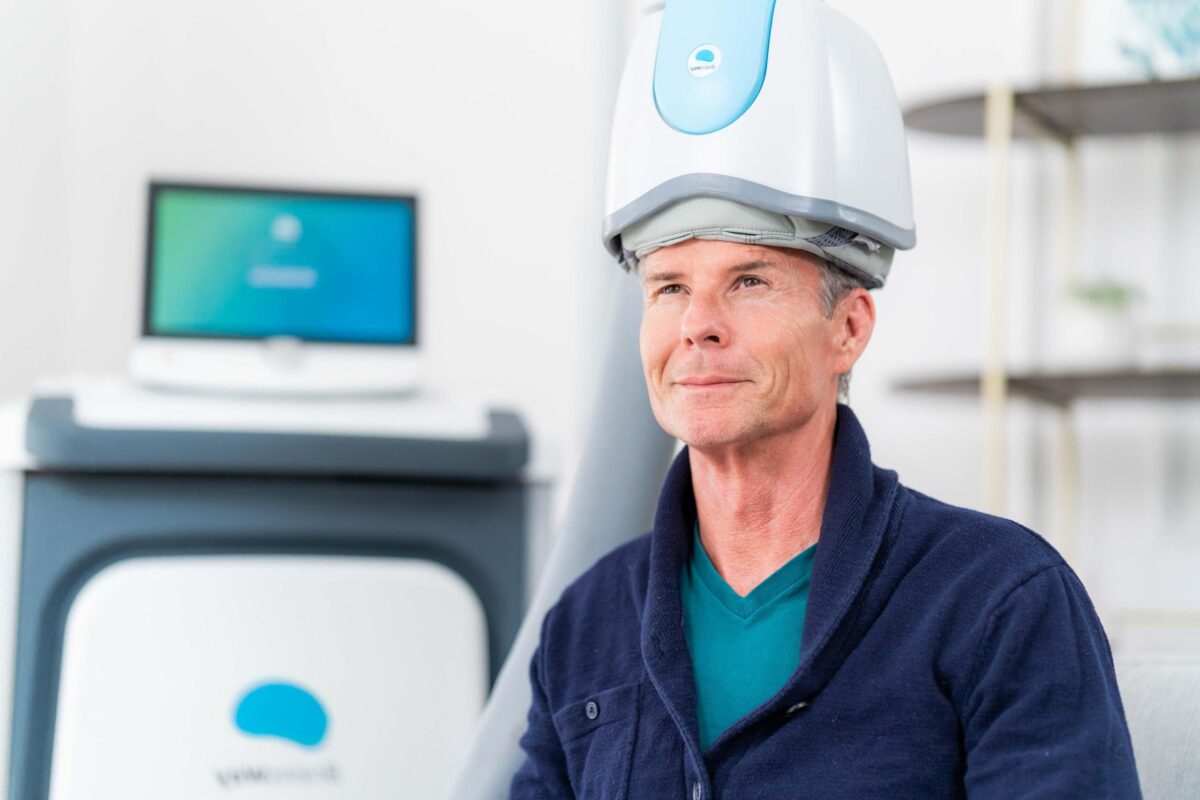Traumatic Brain Injury (TBI) is a life-altering condition that can result from accidents, falls, sports injuries, or other head trauma. It disrupts normal brain function and can lead to cognitive, emotional, and physical challenges. For many individuals, the recovery journey is long and complex, requiring a combination of therapies and interventions.
Transcranial Magnetic Stimulation (TMS) has emerged as a promising treatment for TBI, offering a non-invasive approach to support brain healing and improve function. This guide will explore how TMS works for TBI recovery, its benefits, what to expect during treatment, and why Axon Integrative Health is at the forefront of this innovative therapy.
Understanding TBI and Its Impact on the Brain
A TBI occurs when a sudden blow or jolt to the head disrupts normal brain function. The severity can range from mild (concussion) to severe, with symptoms varying widely based on the extent of the injury. Common effects of TBI include:
- Memory problems and difficulty concentrating
- Emotional instability, such as mood swings, anxiety, or depression
- Headaches, dizziness, and fatigue
- Impaired motor function or coordination
The brain’s ability to recover depends on its neuroplasticity—its capacity to form new neural connections and adapt to injury. While traditional treatments like physical therapy, occupational therapy, and cognitive rehabilitation aim to harness this plasticity, TMS provides a direct way to stimulate and enhance brain activity.
What is Transcranial Magnetic Stimulation?
TMS is a non-invasive treatment that uses magnetic fields to stimulate specific areas of the brain. During a session, a magnetic coil placed near the scalp delivers pulses that penetrate the skull and activate neurons in targeted regions.
For TBI, TMS focuses on areas of the brain affected by the injury, promoting neural activity and encouraging the formation of new connections. By jumpstarting underactive regions or calming overactive ones, TMS can help restore balance and support recovery.
Learn more about how TMS works at Axon Integrative Health’s TMS overview.
How TMS Benefits Individuals with TBI
TMS offers several advantages for individuals recovering from TBI. It addresses both the neurological and psychological aspects of the condition, making it a comprehensive option for recovery.
Improved Cognitive Function
One of the primary challenges after a TBI is cognitive impairment, such as difficulty with memory, attention, or problem-solving. TMS targets areas of the brain responsible for these functions, enhancing neural activity and improving cognitive performance.
Emotional Regulation
Many TBI survivors experience mood disorders like depression and anxiety. TMS can help regulate the brain’s emotional centers, reducing symptoms and promoting a sense of balance. This dual impact on cognition and mood makes TMS an invaluable tool in TBI rehabilitation.
Reduction in Fatigue and Brain Fog
Chronic fatigue and brain fog are common complaints among TBI patients. TMS helps boost brain energy levels and improve overall mental clarity, enabling individuals to engage more fully in their daily lives and other therapies.
Enhanced Neuroplasticity
By stimulating the brain, TMS encourages the formation of new neural pathways, which is essential for recovery. This enhanced neuroplasticity allows other therapies, such as physical or occupational therapy, to be more effective.
For detailed information on how TMS aids recovery from neurological conditions, visit Axon Integrative Health’s dedicated TMS page.
The Science Behind TMS for TBI
TMS works by targeting specific brain regions associated with the symptoms of TBI. For example:
- The prefrontal cortex, often impacted by TBI, is responsible for decision-making, emotional regulation, and executive function. Stimulating this area can improve cognitive abilities and mood.
- The motor cortex plays a role in physical coordination and movement. TMS can help restore motor function in individuals experiencing difficulty with movement or balance.
Research supports the effectiveness of TMS for TBI. Studies show that patients who receive TMS report improvements in memory, attention, and emotional well-being. In some cases, TMS has been linked to reduced reliance on medications, further enhancing its appeal as a treatment option.
What to Expect During TMS Treatment
For those considering TMS, understanding the process can ease any apprehension about starting therapy. At Axon Integrative Health, the journey begins with an initial consultation to assess your symptoms, medical history, and treatment goals. This step ensures TMS is a safe and effective option for your specific needs.
During a Session
TMS sessions are conducted in a comfortable, outpatient setting. Here’s what you can expect:
- You’ll sit in a chair while a trained technician positions the magnetic coil near the targeted brain area.
- The coil delivers gentle pulses, which may feel like a light tapping sensation on the scalp.
- Sessions typically last between 30 and 60 minutes, and you’ll remain fully awake and alert throughout.
After the Session
There’s no downtime after TMS, so you can immediately resume your daily activities. Some patients may experience mild side effects, such as scalp discomfort or slight headaches, but these are temporary and typically subside quickly.
Is TMS Right for You?
TMS is a versatile therapy suitable for many individuals recovering from TBI. It’s particularly beneficial for those who:
- Have not found relief through traditional treatments alone
- Experience persistent cognitive or emotional symptoms
- Seek a non-invasive, drug-free option to complement their existing therapies
Because TMS is tailored to each individual, a consultation with the experts at Axon Integrative Health can help determine if it’s the right choice for you.
Combining TMS with Other Therapies
TMS works best as part of a comprehensive treatment plan. At Axon Integrative Health, TMS is integrated with other therapies to maximize results. For example:
- Physical therapy helps rebuild strength and coordination while TMS supports neural recovery.
- Occupational therapy addresses daily living skills, enhanced by the cognitive improvements from TMS.
- Psychotherapy focuses on emotional well-being, with TMS helping to regulate mood and reduce anxiety.
This multi-faceted approach ensures that every aspect of recovery is addressed, providing patients with the best chance for meaningful improvement.
The Future of TMS for TBI
As research into TMS continues, its potential applications for TBI recovery are expanding. Scientists are exploring ways to optimize treatment protocols, including adjusting stimulation frequencies and intensities to suit individual needs. Advanced imaging techniques, such as fMRI, are also being used to refine targeting, ensuring TMS is as precise and effective as possible.
In the coming years, TMS may become a standard part of TBI rehabilitation, offering new hope for individuals facing the challenges of brain injury.
Take the Next Step with Axon Integrative Health
Recovering from a traumatic brain injury is a challenging journey, but innovative treatments like TMS are providing new pathways to healing. By directly stimulating the brain’s recovery mechanisms, TMS offers a unique and effective way to address the cognitive, emotional, and physical symptoms of TBI.
At Axon Integrative Health, the dedicated team of professionals is committed to helping patients achieve their recovery goals with cutting-edge therapies tailored to their needs. With a focus on evidence-based care and personalized attention, Axon Integrative Health ensures that every patient receives the best possible treatment.
To learn more about how TMS can help with traumatic brain injury, visit Axon Integrative Health’s TMS overview. Take control of your recovery and discover the difference TMS can make in your journey toward wellness.





